While the interim government does not have the mandate to allow a humanitarian corridor, it continues to push for the United Nations-backed facility to channel aid for the stranded population in the war-torn Rakhine State of Myanmar despite opposition from the army, politicians, and civil society.
Army Chief General Waker-uz-Zaman on May 21 said that the Bangladesh Army would never be involved in any activity that was detrimental to sovereignty.
He believes that such a decision on the corridor should come from an elected government, and it should be made by following a legitimate process. Here, national interests should be maintained, and it should be done through political consensus.
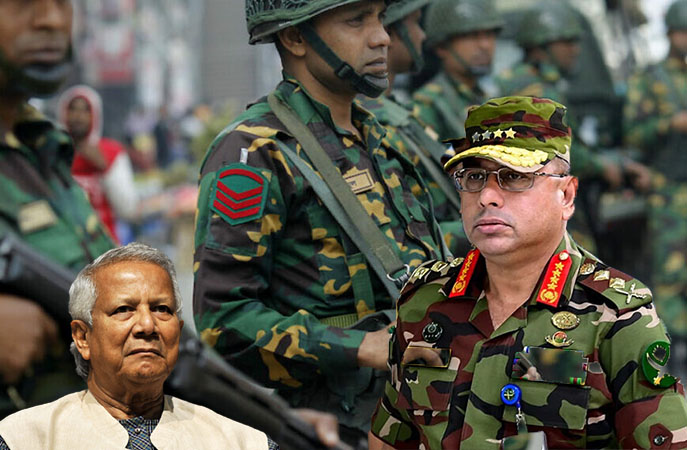
Most of the political parties, including the Awami League, BNP, and leftists, have vehemently rejected the plan.
Apart from politicians like former prime minister Sheikh Hasina, influential civil society groups and security experts have also expressed concern over the move, which was put forward by the UN Secretary-General António Guterres during his visit to Bangladesh on March 15.
Awami League President Sheikh Hasina said the illegal interim government led by Yunus is selling the country to its Western masters by allowing corridors, a military base in the Bay of Bengal, and helping establish a Christian state bordering Myanmar and India’s Seven Sisters, a proposal she declined during her rule.
The corridor has also been a headache for the governments of Myanmar, India, and China.
Sheikh Hasina said the lives of the bordering people and the Bangladesh Army members would be at stake if the junta forces took military action to thwart the corridor.
There is speculation that the interim government is inviting a US-linked company to operate the newly built largest terminal of the Chittagong Port to facilitate the corridor.
In Dhaka, Guterres said the United Nations is discussing the possibility of a humanitarian aid corridor to Myanmar from Bangladesh in an effort to create equitable conditions for Rohingya refugees to eventually return, which is being delayed due to the ongoing fight between the Myanmar junta and the Arakan Army (AA) rebels.
Setting up a humanitarian aid channel “is obviously a matter that would require authorisation and cooperation of the parties to the conflict,” he said without further specifying.
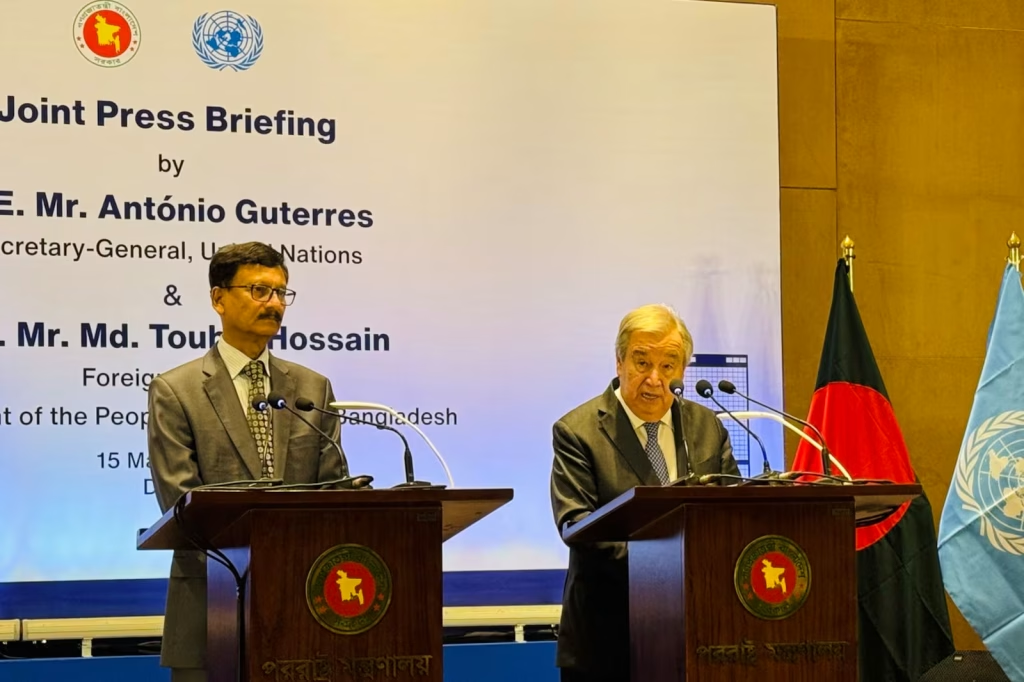
While there is no sign of repatriation, some 180,000 Rohingyas have entered Bangladesh since August last year through the porous border of 271km. Despite that, Yunus in March falsely boasted that the Rohingyas would be able to return by early next year.
It is widely believed that Guterres revealed the proposal after an understanding with Chief Adviser Muhammad Yunus. But the danger of armed conflict and the presence of other armed groups are the major concerns for Bangladesh’s sovereignty.
On April 8, Khalilur Rahman, the chief adviser’s top aide, publicly mentioned the concept of a “humanitarian channel” for the first time. He said discussions about Bangladesh’s potential involvement in such a mechanism began during a Feb 7 meeting with Guterres in New York.
According to him, preliminary consultations had taken place with the Arakan Army, international organisations, and the Myanmar government.
“We told him [Guterres] that there is no alternative to international assistance to address the humanitarian crisis in Rakhine. That operation must take place under UN supervision,” Khalilur said.
Bangladesh also proposed several conditions, which include a ceasefire in Rakhine, ensuring representation of the Rohingya in Rakhine’s leadership, and establishing conditions in the state for the eventual repatriation of Rohingya refugees.
Meanwhile, radical Jamaat-e-Islami has proposed a Muslim state in Rakhine, while Bangladeshi jihadists have vowed to wage jihad to this end.
Other armed groups currently active in the region with similar aims are Ansar al-Islam, Jama’atul Mujahideen Bangladesh (JMB), Harkatul Jihad al-Islami Bangladesh (HuJI-B), Hizb ut-Tahir, Arakan Rohingya Salvation Army (ARSA), Rohingya Solidarity Organization (RSO), Kuki-Chin National Front (KNF), and Jama’atul Ansar Fil Hindal Sharqya.
Recently, security forces seized a huge number of military uniforms in Chittagong, believed to be for the KNF or Jama’atul Ansar, who have been working together for over five years in the Chittagong Hill Tracts to establish a separate country.
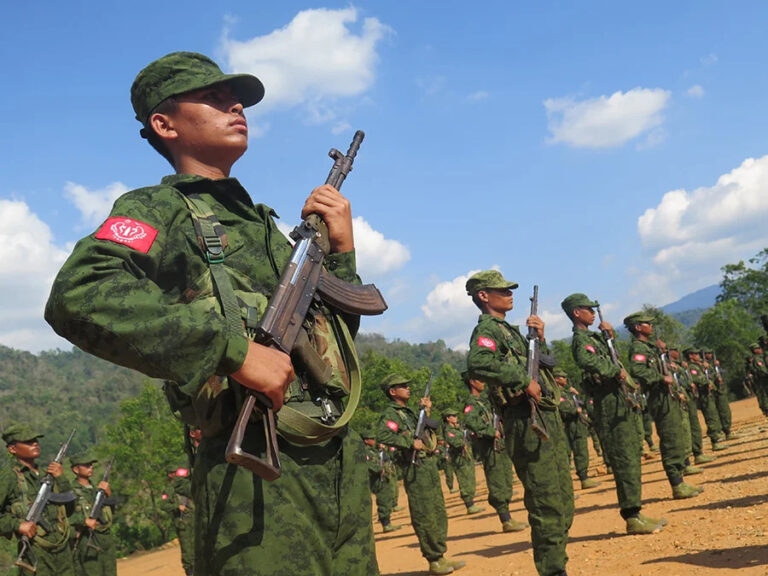
Following the seizure of 51,000 military uniforms, Bangladesh’s intelligence sources said the uniforms were manufactured for the AA, which has a presence in the Bandarban district.
In contrast, the fighters from ARSA and RSO are actively supporting the junta in its fight against the AA rebels, who have occupied over 80% of Rakhine.
Historically, RSO has been associated with Bangladeshi jihadist groups for over four decades, while ARSA emerged in 2012-13.
Now, approximately 20,000 Bangladeshi Islamist militants are ready to join ARSA and RSO. Sources claim these individuals were recruited through a US-backed global network and have been provided with weapons, training, and communication equipment in a highly organised manner.
The Jamaat-controlled Yunus-led interim government is strategically supporting these jihadist groups and facilitating connections with foreign donors to help advance an extremist agenda.
His involvement, ranging from arms assistance through the so-called humanitarian corridors to other means,s has raised serious concerns, leading to significant public outrage against him.
Timeline
April 27, 2025: Foreign Adviser Md Touhid Hossain revealed the issue of the corridor during a press briefing at his ministry office.
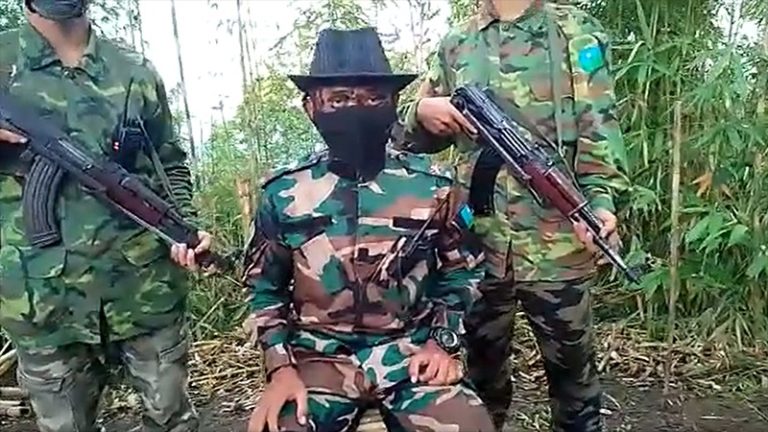
He said the interim government agrees in principle, subject to conditions, to the UN proposal to establish a humanitarian corridor through Bangladesh to send aid to Rakhine. “It will be a humanitarian passage. However, we have certain conditions. I will not go into details. If the conditions are met, we will certainly provide assistance.”
He thinks the corridor will help facilitate the return of the Rohingya refugees in Bangladesh.
He added: “The entire border is now under the control of a non-state actor (AA rebels). There is no
control of Myanmar’s central government there. Therefore, for our own interests, some form of communication is necessary— although we cannot formally communicate with the non-state actor, it will not be possible for us to stay entirely disconnected even if we want to.”
April 28: Dr Yunus’ newly appointed National Security Adviser, Khalilur Rahman, told AFP that Bangladesh would be willing to provide technical assistance.
“We believe that stability will be restored in Rakhine through humanitarian assistance with the support of the UN, which will create a conducive environment for the return of refugees,” he said. He also noted that discussions on a humanitarian aid route were still ongoing, adding, “There needs to be a consensus among various stakeholders. We are engaged with the UN and other relevant parties on this issue.”
April 28: UN High Commissioner for Refugees Filippo Grandi told the UN Security Council in New York that Bangladesh’s interim government has chosen to engage with the parties to the conflict in Rakhine in pursuit of a solution.
April 28: On the government’s remarks, BNP Secretary General Mirza Fakhrul Islam Alamgir said that the government should have consulted on the issue before deciding to provide a “humanitarian corridor” for Rakhine state, as it is related to the country’s security and sovereignty.
April 29: Chief Adviser’s Press Secretary Shafiqul Alam justified the necessity of the corridor.
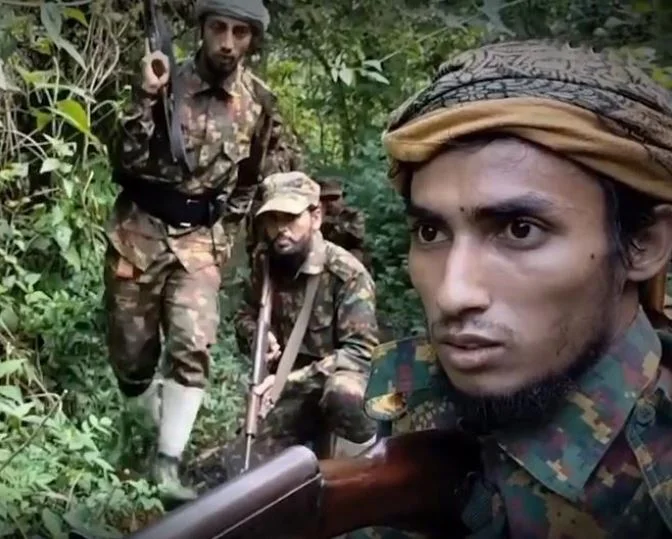
On his verified Facebook page, he said that Rakhine is facing an acute humanitarian situation, and that Bangladesh has a stellar record in helping countries in times of distress, as exemplified by our aid to Myanmar following a recent devastating earthquake.
“Moreover, we are concerned that the persistence of suffering may lead to further inflows of people from Rakhine into Bangladesh, which we cannot afford.
“We also believe that the UN-supported humanitarian aid would help stabilise Rakhine and create conditions for the return of the refugees to Myanmar.”
He said that, given the present conditions, the only viable route for the delivery of aid to Rakhine is through Bangladesh. “Bangladesh agrees in principle to provide logistics support to the transportation of aid through this route. However, there has not been a decision on the provision of aid to Rakhine.
“We are in touch with the parties concerned in this regard. In due course, we will consult relevant stakeholders in Bangladesh.”
As regards the reports of involvement of a major power, Shafiqul said: “These are pure and unadulterated propaganda. We have seen a constant barrage of malicious disinformation hurled against Bangladesh in recent months, which still continues. This sort of propaganda is no different.”
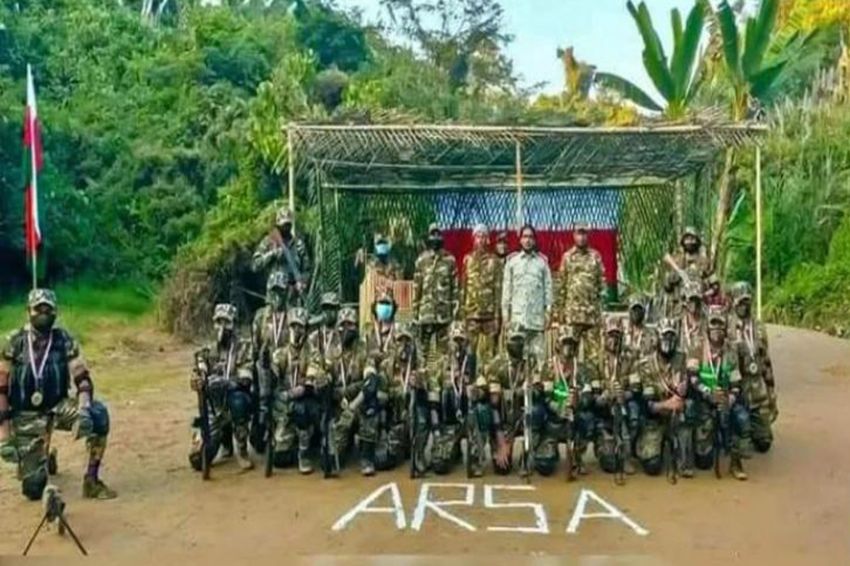
Shafiqul also said the government has not discussed the so-called “humanitarian corridor” with the UN or any other entity, but it would be willing to provide logistical support to the transportation of aid to Rakhine state through Bangladesh.
“Our position is that, should there be UN-led humanitarian support to the state of Rakhine, Bangladesh would be willing to provide logistics support,” he said.
April 30: The government’s desperation to implement the corridor became clearer after Khalil said that Bangladesh is in contact with the Myanmar junta and the AA on the issue of stability, humanitarian aid, and Rohingya repatriation.
“As the UN wants to provide humanitarian aid, we would like to support that. This can help stabilise the Rakhine state and create conditions for Rohingya repatriation,” he told The Daily Star.
“The discussion is ongoing. We will definitely make it public to the nation at the right time.”
He said the UN will be holding a high-level conference on Rohingyas in New York in September.
Khalilur, who is known in the US as Roger Rahman, is also the chief adviser’s high representative on Rohingya and other priority issues. He left Bangladesh during the four-party alliance government after his involvement in an extramarital relation led to a double murder.
May 1: BNP acting chairman Tarique Rahman, in a virtual speech, said that only an elected parliament can make such a sensitive decision.
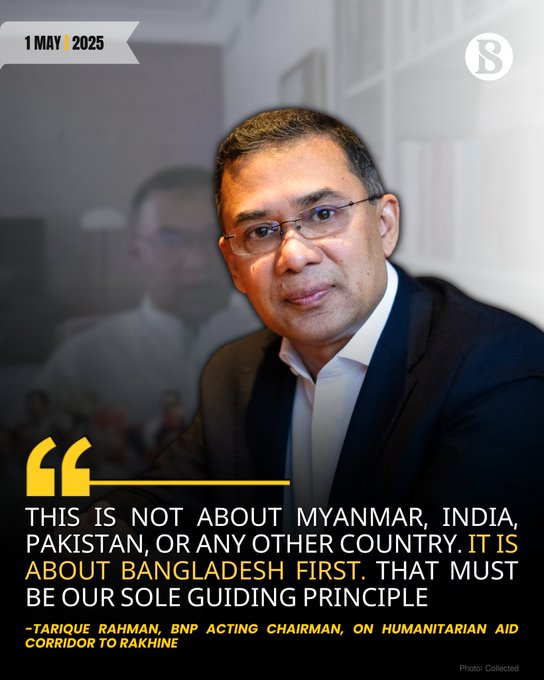
He deplored that the interim government had neither informed the public nor felt the need to consult the political parties that represent people on a sensitive matter directly related to the country’s independence and sovereignty.
May 2: Shafiqul had to clarify the matter amid a huge outcry. He said that if the UN leads the initiative, a decision will be made after discussions with “everyone” involved.
“We agree to the humanitarian corridor if the UN takes the initiative. The whole thing will proceed after speaking to both countries. When the UN operates, it engages all relevant parties—that means they will talk to the Myanmar government and also speak with us. A decision would only be reached after that,” Shafiqul said at a discussion in Chittagong.
May 4: Khalilur was embarrassed by the criticisms and said that no agreement has been reached with any party on the proposed humanitarian corridor or any related matter.
“We have not held any discussions on a humanitarian corridor. We have not reached any agreement with the parties concerned on this or any other issue,” he said.
May 8: Chinese Ambassador to Bangladesh Yao Wen said his country is not involved in the humanitarian corridor initiative being discussed. “China does not interfere in any internal affairs of any country,” he said at the event in Dhaka.
He thinks that Bangladesh and Myanmar can properly solve the Rohingya issue through peaceful dialogue and promote the process of repatriation.
“China had mediated between Bangladesh and Myanmar for the Rohingya return, but that stopped in late 2023 because of the conflicts in Rakhine State, which still continue,” Yao said. However, China will facilitate dialogue between the two countries, he added.
May 17: The BNP acting chairman, Tarique Rahman, reiterated that the interim government does not have the authority to take decisions on the humanitarian corridor.
“It seems the interim government is giving more priority to granting corridors and transferring control of the port to foreign hands,” he said at an event. “Let us make it clear once again—decisions on such matters do not fall within the authority of an interim government. These decisions must be made by a national parliament or a government elected by the people’s vote,” he said.
May 21: Khalil held a press conference to rule out any possibility of allowing a corridor through Bangladesh for Myanmar, saying the government has neither discussed nor intends to discuss such a proposal with any party. But it was a blatant lie.
“There has been no discussion with anyone regarding giving a ‘corridor’ to Myanmar through Bangladesh, and we will not even discuss it,” he said.
He clarified that current discussions with the UN solely focused on facilitating the delivery of humanitarian aid, such as food and medicine, through some channels to Myanmar’s Rakhine State, which is facing a serious humanitarian crisis.
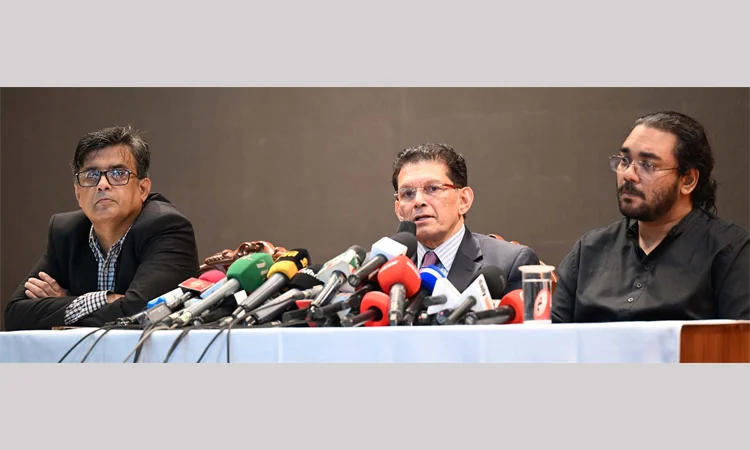
He emphasised that any future decisions in this regard will be made in consultation with all relevant stakeholders. “We can’t give anyone any free pass,” he added, underscoring the importance of protecting Bangladesh’s national interests.
The security adviser said if Dhaka decides to allow the aid transportation to Rakhine through a cross-border aid channel, Bangladesh will only maintain the border security to scrutinise the items of aid.
The aid, only medicine and food, will be totally managed by the UN, and it will be out of the allocation from the Rohingyas who have been residing in the camps inside Bangladesh.
He dismissed any notion of miscommunication between government bodies, noting that there is close coordination among the National Security Office, the Ministry of Foreign Affairs, and the Bangladesh Army.
According to the adviser, the “corridor” discourse initially surfaced in the media of a neighboring country, without the name of India.
May 21: When journalists asked about the Rakhine corridor, Foreign Affairs Adviser Touhid Hossain said: “Do not ask me any questions about this.
Politicians, experts oppose corridor
On May 31, a high-level discussion was held in Dhaka on Bangladesh’s geopolitical security and the humanitarian corridor, organized by the Centre for Governance and Security Analysis at the CIRDAP auditorium in the capital on Saturday afternoon.
They said the issue of providing a humanitarian corridor to Myanmar’s Rakhine state is related to the existence and security of Bangladesh. However, the government has moved forward on this issue without discussing it with anyone in society.
There is no transparency on the part of the government regarding the establishment of a humanitarian corridor in Rakhine. The government should stop such activities. There is no opportunity to provide a corridor, no channel for Myanmar.
BNP Standing Committee member Amir Khasru Mahmud Chowdhury said: “Bangladesh should not be taken to the front line (frontline war). Our existence is a matter here. Our security is a matter here. The country’s stability is a matter. What are you (the head of government) trying to achieve by taking such a big risk?”
Noting that the work of the interim government was to take the country towards a democratic state through electoral reforms, Khasru said that everything is being done without going to that place.
Responding to the government’s claim that if the corridor is provided, the Rohingyas can be sent back through the AA, he questioned why the Rohingyas should be sent back through the corridor.
“The government first said that a policy decision on the corridor had been taken. Subsequently, the government reiterated that it has not made a decision on the issue and will not do so. I don’t understand why there is so much secrecy in the whole matter.”
Mahmudur Rahman Manna, president of Nagorik Oikya, said that as long as Yunus is in power, he will not say anything about the humanitarian corridor. If the corridor is given, Bangladesh will not be able to control it.
Manna suggested a “hidden agenda” behind the government’s denials about the corridor issue. He said that when the state deceives the people, the people need to be very careful. Because the country may be in danger.
Both Khasru and Manna, along with other speakers, called for national elections before December.
“Only four or five unregistered parties, with no public support, do not want elections. Similar ‘king’s parties’ had emerged during the 1/11 changeover,” Khasru added.
Colonel (Retd) Md Jaglul Ahsan, Executive Director of the Centre for Governance and Security Analysis, presented the keynote speech at the event. He said that it would not be right for the government to make such a decision alone. Since there is currently no parliament, decisions will have to be made after open discussions with political parties.
The paper also mentions that the government is not transparent about establishing a humanitarian corridor in Rakhine. It says that Bangladesh should not get involved in a complex conflict with a neighboring country like Myanmar. This risk is not in Bangladesh’s national interest.
Former Ambassador Major General (Retd) Shahidul Haque said everyone is discussing security. This is beneficial for the country.
Saiful Haque, General Secretary of the Revolutionary Workers Party, said: “We want to tell the government, you have done enough. Please stop this activity as much as you have done.”
In most cases, humanitarian corridors have ultimately been reduced to military corridors. The country will definitely not bring crocodiles by cutting a canal, he added.
Security analyst Major General (Retd) Md Kamruzzaman believes that, apart from Bangladesh, they are in various countries, including Pakistan, Indonesia, Thailand, and Laos.
Pro-Jamaat AB Party Chairman Mujibur Rahman said that if the Rohingyas can be sent there under the pretext of sending this humanitarian aid, it would be a great achievement.
“The chief adviser must clarify whether it is a corridor or a channel. This is not a matter for unilateral decision-making — it requires collective consensus,” he added.
Nurul Haque Nur, president of the Gono Odhikar Parishad, mentioned that 100,000 to 150,000 Rohingyas have come to Bangladesh since the interim government took office. “This government has not been able to stop the influx of Rohingyas again. In that case, there is enough reason to be concerned about providing a humanitarian corridor. This government should not have gotten involved in such a sensitive issue.”
Humaira Noor, Joint Member Secretary of Yunus’ Jatiya Nagorik Party, questioned why Bangladesh should provide such a humanitarian corridor when efforts are being made to free the country from the hands of superpowers.
She doubted whether the country could manage the potential security and political risks.
BNP leader Nilofar Chowdhury, Basad leader Razequzzaman Ratan, UPDF organizer Michael Chakma, and senior journalist MA Aziz also spoke at the meeting moderated by Professor Robayet Ferdous.